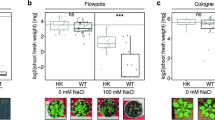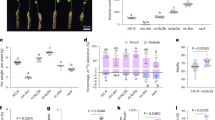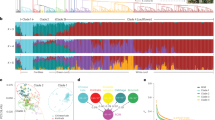Abstract
CLOVER rot, caused by the fungus Sclerotinia trifoliorum Erikss., occurs in about 70 per cent of farm crops of red clover (Trifolium pratense) in Great Britain, according to a recent survey by Lester and Large1. But there are few reports of this fungus infecting white clover (Trifolium repens). Moore2, Sampson and Western3 and Dillon Western, Loveless and Taylor4 have reported occasional damage in white clover in Great Britain, but in no instance was the disease considered to be of economic importance.
This is a preview of subscription content, access via your institution
Access options
Subscribe to this journal
Receive 51 print issues and online access
$199.00 per year
only $3.90 per issue
Buy this article
- Purchase on Springer Link
- Instant access to full article PDF
Prices may be subject to local taxes which are calculated during checkout
Similar content being viewed by others
References
Lester, E., and Large, E. C., Plant Pathol., 7, 115 (1958).
Moore, W. C., British Parasitic Fungi, 347 (Cambridge Univ. Press, 1959).
Sampson, K., and Western, J. H., Diseases of British Grasses and Herbage Legumes, 58 (Cambridge Univ. Press, 1954).
Dillon Weston, W. A. R., Loveless, A. R., and Taylor, R. E., J. Agric. Sci., 36, 18 (1946).
Author information
Authors and Affiliations
Rights and permissions
About this article
Cite this article
ALDRICH, D., DOLING, D. Varietal Resistance to Clover Rot in White Clover. Nature 214, 946–947 (1967). https://doi.org/10.1038/214946a0
Received:
Issue Date:
DOI: https://doi.org/10.1038/214946a0
This article is cited by
-
Clover rot
The Botanical Review (1984)
Comments
By submitting a comment you agree to abide by our Terms and Community Guidelines. If you find something abusive or that does not comply with our terms or guidelines please flag it as inappropriate.



